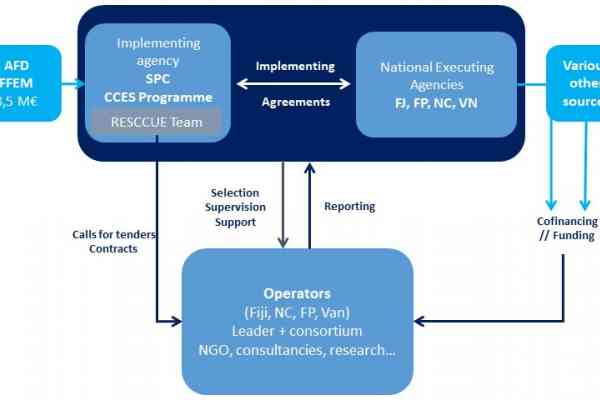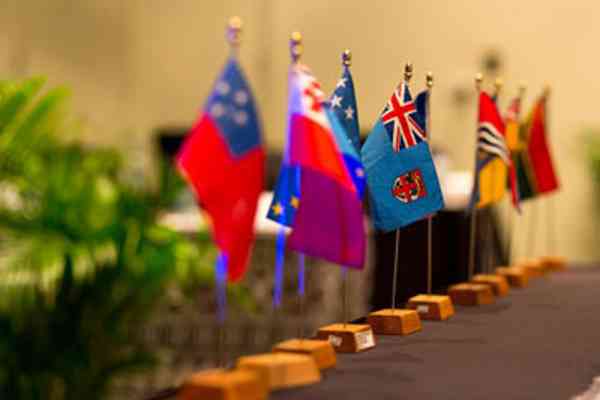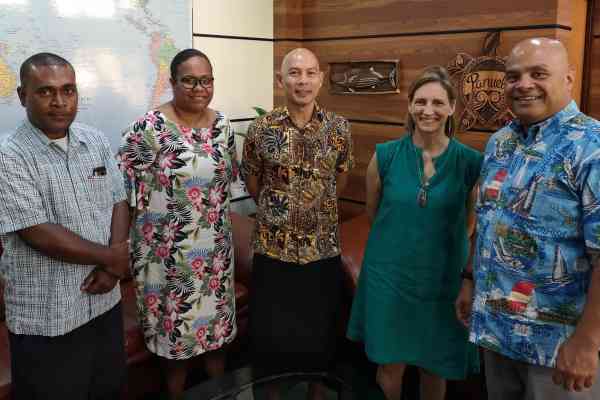- Your Excellency, President David Panuelo of the Federated States of Micronesia,
- Mr Sean Callahan, US AID Deputy Mission Director to the Pacific,
- Her Excellency, Ms Elise Tokumasu de Silva, Acting Chargé d’Affaires, United States Embassy in Fiji,
- Dr Stuart Minchin, Director General of SPC,
Distinguished Delegates,
It is a privilege and pleasure to provide the keynote address for today’s event to launch ‘PROJECT Governance’ - a 5-year regional good governance initiative funded by the US Government. The Pacific Community in collaboration with East West Centre, the International Foundation for Electoral Systems and CARE USA will lead implementation.
I am advised that ‘PROJECT Governance’ is anchored in both the 2000 Biketawa Declaration and the 2018 Boe Declaration on Regional Security, and that it is designed to strengthen existing good governance frameworks in the Pacific by promoting sound, just and responsive governance including through transparency of governance institutions and effectiveness of accountability mechanisms.
I welcome the timeliness of this programme in our collective efforts to fulfil our commitments to the 2030 Agenda and the SDGs, the Framework for Pacific Regionalism, the SAMOA Pathway as well as the Paris Agreement amongst many other regional and global commitments.
I would also venture to add that our governments and Blue Pacific region are also not unfamiliar with these concepts.
In fact, and as some of you may recall, Pacific Island Forum Leaders accepted in 2003 by way of the Forum Principles of Good Leadership, the challenge to improve and provide effective national leadership, in particular, one of high accountability in all aspects of public life.
The 2003 Forum Principles of Good Leadership comprise nine principles, with respect for the law and system of government, respect for human rights and respect for office being high among them. Additionally, and recognising the links of good governance to economic growth and sustainable development, many of our Pacific Island countries today are members of the UN Convention against Corruption (UNCAC).
Our Blue Pacific region is in a continuous state of change and progression, in large part driven by our desire and aspirations to live a good quality of life. But we face numerous shared challenges from managing and mitigating the effects of climate change to sustainably managing our ocean and fisheries resources and accelerated loss of biodiversity, to now guarding against the spread of the COVID-19 pandemic and its debilitating socio-economic impacts.
It would seem, therefore, that many of our Pacific island countries’ economic development would remain tenuous and fragile across the region, with continuing high dependence on development assistance and delivery of basic services.
Added to this, is the unprecedented interest by a wide range of external actors in our region, resulting in a crowded and complex geopolitical Blue Pacific landscape. Against this backdrop, “PROJECT Governance’ presents a further opportunity for our member governments respectively, and collectively as the Blue Pacific region to reassess our positions.
Key to the success of this programme is respect for all human rights and fundamental freedoms, democratic principles, good governance and the rule of law. These are indispensable elements already inherently recognised in the Constitutions and laws of our countries, in the Declarations and Statements of our Pacific Leaders, in the agreements, visions and values of our regional organisations, in our national budgets and development strategies, and in the everyday conduct of our relations with all Pacific Island countries, our development partners and international organisations.
As well, these elements are fundamental for the achievement of the program objectives of “PROJECT Governance’, to mention a few - where public sector transparency and accountability is increased; where elections and political processes are competitive, accessible, and conducted with integrity; where an active, educated and inclusive civil society is empowered; and where civic education for our Pacific’ youth is bolstered. These in turn can support our continued collective efforts to improve human development, sustainably grow our economy and reduce poverty, improve gender equality, and enhance good governance as well as political and social conditions for stability and safety.
I expect that many questions will be asked as the programme gets underway, one of which could be ‘what can we expect from this programme that we have not already tried?’ There are no simple answers to such questions as we know too well of constraints and challenges that we face in the implementation of work nationally, and regionally.
Many accounts of past work have established that the difficulties are real, and that the results should serve to inform us of the circumstances and prevailing considerations in our respective countries. Governance and good governance hold different meaning to different people and governments, and this is particularly true in the case of our Pacific Island countries with our strong and vibrant cultures and traditions.
I am hopeful that ‘PROJECT Governance’ will enable a better tailoring of approaches to suit the particular circumstances of our countries noting also our continued struggles with compliance and reporting obligations.
Importantly, I would encourage us to continue to explore the possible harmonisation of traditional and present-day governance structures to not only benefit our Pacific peoples, but to support our traditional leaders in formal policy making. Our Blue Pacific region is relatively stable notwithstanding our young democracies and varying good governance and human rights records.
While the roles and functions of key institutions in our countries and our Blue Pacific region are functioning well, further efforts must be made to support and strengthen them to ensure that we continue to uphold the principles of good governance. In particular, integrity and oversight bodies must be empowered with resources and authority to effectively do their work.
The events that unfolded following our general elections this past April created what many called a ‘constitutional crisis’. The passage of time from elections to today has been very difficult and it will be recorded in the annals of Samoa’s history as a journey of a mature democracy, which nonetheless served to divide and test the key pillars of our society – our faith, our culture and the rule of law.
However, less than a week ago, the Samoa Parliament passed the national budget – the first for my government, and two days ago, I delivered my first statement as the first female Prime Minister of Samoa at the general debate of the 76th session of the United Nations General Assembly.
That we were able to achieve these notwithstanding the challenges we face as a country and people is testament to Samoa’s continued strong belief in the rule of law, democratic principles, good governance and the protection of the rights of our people.
Excellencies,
There is much one could say on the value of traditional and contemporary governance, the rule of law and accountable decision-making, but time is of the essence. Allow me to convey my Government’s appreciation and gratitude to the Government of the United States and the SPC for its invaluable support and assistance, and I look forward to the successful implementation of this programme.
Thank you.
Useful link:
Livestream of Virtual Launch of Promoting Just, Engaged, Civic-minded and Transparent (PROJECT) Governance programme


